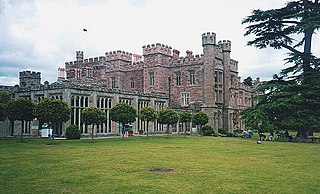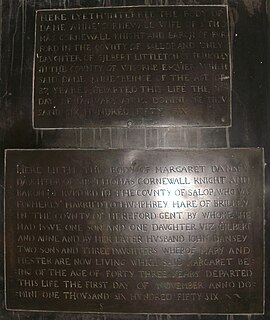This page is based on this
Wikipedia article Text is available under the
CC BY-SA 4.0 license; additional terms may apply.
Images, videos and audio are available under their respective licenses.

Earl Coningsby was a title in the Peerage of Great Britain. It was created in 1719 for Thomas Coningsby, 1st Baron Coningsby, with remainder to his eldest daughter, Margaret Newton, 1st Viscountess Coningsby, and the heirs male of her body. He was the great-grandson of the soldier and politician Sir Thomas Coningsby. Coningsby had already been created Baron Coningsby, of Clanbrassil, in the Peerage of Ireland in 1693, with normal remainder to heirs male, and Baron Coningsby in the Peerage of Great Britain in 1716, with similar remainder as for the earldom. On Lord Coningsby's death in 1729 he was succeeded in the Irish barony of 1692 by his grandson Richard Coningsby, the second Baron, the son of one of Coningsby's sons from his first marriage to Barbara Georges. However, Richard died already the same year, when the barony became extinct. Lord Coningsby was succeeded in the English barony and the earldom according to the special remainder by his daughter Margaret Newton, 1st Viscountess Coningsby. She had already in 1716 been made Baroness Coningsby, of Hampton Court in the County of Hereford, and Viscountess Coningsby in her own right. Both titles were in the Peerage of Great Britain. Lady Coningsby was the wife of Sir Michael Newton, 4th Baronet, of Barrs Court. She had no surviving male issue and the titles became extinct on her death in 1759.
Coningsby, or The New Generation is an English political novel by Benjamin Disraeli, published in 1844. It is rumored to be based on Nathan Mayer Rothschild. According to Disraeli's biographer, Robert Blake, the character of Sidonia is a cross between Lionel de Rothschild and Disraeli himself.
Sir William Coningsby,, was an English Member of Parliament and a Justice of the King's Bench.

Thomas Coningsby, 1st Earl Coningsby PC of Hampton Court Castle, Herefordshire was an English politician who sat in the House of Commons at various times from 1679 until 1716 when he was created a peer and sat in the House of Lords

Sir Thomas Coningsby was an English soldier and Member of Parliament, notable for his diary of military action in France in 1591.

Sir Gilbert Lyttelton MP was an English landowner, politician, and knight from the Lyttelton family.
John Scudamore, 1st Viscount Scudamore was an English diplomat and politician who sat in the House of Commons at various times between 1621 and 1629. In 1628 he was created Viscount Scudamore in the Irish peerage.

George Capel-Coningsby, 5th Earl of Essex FSA was an English aristocrat and politician, and styled Viscount Malden until 1799. His surname was Capell until 1781.
Sir Francis Wyndham, 1st Baronet of Trent in Somerset was an English soldier and politician who sat in the House of Commons of England in 1640. He was a colonel of horse in the Royalist army in the English Civil War and helped Charles II escape to France.
Sir Humphrey Winch (1555–1625) was an English-born politician and judge. He had a distinguished career in both Ireland and England, but his reputation was seriously damaged by the Leicester boy witch trials of 1616.
Fitzwilliam Coningsby was an English politician who sat in the House of Commons in 1621 and in 1640. He supported the Royalist cause in the English Civil War.
John Sibthorpe (1669–1718), of St. Mark's, Lincoln, was an English politician.
Thomas Coningsby was an English soldier and MP for Herefordshire.
Thomas Coningsby II, of Hampton Wafer, Herefordshire was an English politician.
Thomas Coningsby I, of Leominster, was an English politician.
Sir Nathaniel Napier, 3rd Baronet, of Moor Crichel, Dorset, was an English landowner and politician who sat in the English House of Commons from 1695 to 1708 and in the British House of Commons from 1710 to 1722.

Sir Michael Newton, 4th Baronet, was an English landowner and politician who sat in the House of Commons from 1722 to 1743.
Sir John Spelman was an English judge from Norfolk, noted for his composition of law reports.






